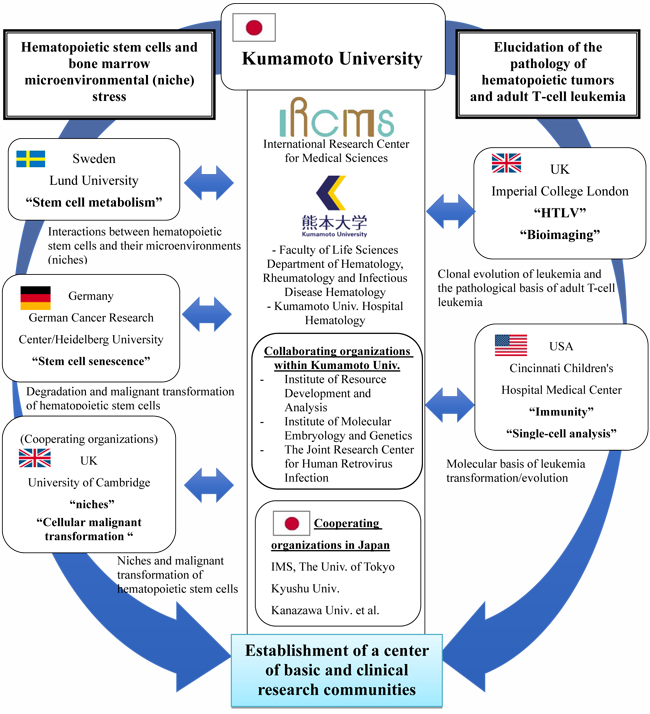- HOME
- Summary of our project
1. Aim
Establishing a research center for the pathology of stress hematopoiesis/leukemia
through integrated basic and clinical research
Hematology is a discipline where the results from basic research can relatively easily be applied to clinical practice (e.g., stem cells for bone marrow transplantation, hematopoietic factors for anemia treatment, and molecular biology for molecular targeted therapy). However, basic and clinical research have recently been separated by reduced human interaction due to the increasingly sophisticated methodologies of basic research, and the specialization of basic and clinical research. This trend is especially prominent in Japan, Europe, and the United States, resulting in the decreasing worldwide presence of Japanese life science research. Before World War II, Professor Etsuzo Komiya of the Department of Hematology, Kumamoto University, first proposed the concept of hematopoietic growth factors. Subsequently, Kawakita and Miyake successfully purified erythropoietin from urine samples from patients, leading to the cloning and clinical application of the erythropoietin gene. Professor Kiyoshi Takatsuki developed clinical research on adult T-cell leukemia (ATL), and Professor Hiroaki Mitsuya recently achieved excellent results in retrovirus research and AIDS treatment. Thus, Japanese researchers in Kumamoto have led the world in basic and clinical research on blood diseases. Toshio Suda, a prestigious researcher in the field of hematopoietic stem cells and the director of the International Research Center for Medical Sciences, Kumamoto University, has worked together with Sashida and Takizawa since the establishment of the research group in 2015 on the interactions between hematopoietic stem cells and their microenvironments, and the infection- and environmental stress-induced changes in stem cell functions and epigenomes using advanced technologies such as single-cell gene expression analysis, single-cell protein analysis system, and ATAC sequencing.
Our research exchange plan aims to conduct joint studies to achieve synergistic effects through collaboration with institutions in the United Kingdom and other Western countries to realize cutting-edge research based on the hematopoietic/blood disease studies at Kumamoto University. Basic research mainly on hematopoietic stem cells in Japan will be strongly recombined with clinical research on leukemia/hematopoietic diseases to establish an international research center for the pathology of stress hematopoiesis/leukemia through integrated basic and clinical studies focusing on our theme "stress and aging/carcinogenesis." Simultaneously, to address the recent issues in Japan, we will educate young researchers to be more competitive with leading researchers worldwide, and enable them to launch original studies and achieve outstanding results more effectively through the research promotion system of the research center.
2. Implementation system

3. Features of our project
(1) Promotion of research on stem cell aging and malignant transformation, and development of next-generation research technologies
Our project addresses three issues as collaborative research to promote studies on "stress hematopoiesis/leukemia" and to develop next-generation research technologies. For cutting-edge life science research, scientific and engineering research techniques, such as in vivo imaging of cells and tissues, and mathematical and big data analyses, in addition to single-cell analysis, should be introduced. These will be established and utilized as basic technologies.
1) Interactions between hematopoietic stem cells and their microenvironments, and their functions
The molecular bases of the self-renewal and pluripotency maintenance mechanisms of stem cells will be elucidated from the viewpoints of gene expression control, intracellular signals, and metabolic control (e.g., endoplasmic reticulum stress and autophagy). Microenvironments (niches) for maintaining the functions of hematopoietic stem cells will be characterized at the molecular, cellular, and tissue levels. Using the findings, in vitro techniques for expanding stem cells will be improved and efficient hematopoietic reconstruction methods after bone marrow transplantation will be established.
2) Aging and malignant transformation of hematopoietic stem cells
The functional roles of stem cells and their niches in the aging and malignant transformation of hematopoietic stem cells will be investigated. The process of forming a leukemia transcription factor network with signals, metabolism, and epigenomic mutations in stem cells will be elucidated. Furthermore, new leukemia treatments targeting leukemia-specific molecules expressed in stem cells or their niches will be developed.
3) Mechanisms of the clonal evolution and progression of leukemia
The pathology of adult T-cell leukemia (ATL), a common disease in Japan, will be further investigated to establish a research center for human T-cell leukemia virus type I. As the involvement of immune/stress response in the pathological evolution of ATL has been suggested, the research center will contribute to the elucidation of the pathology of hematopoietic tumors associated with infectious diseases/inflammatory stress, as well as ATL, and the development of therapeutic methods from the perspective of clonal evolution of ATL.
(2) Seminars and international conferences
Symposiums and international conferences (in person and virtual) will be held to accelerate collaborative research. In addition to the kick-off symposium due to be held early in the project at Kumamoto University, regular seminars will be held once or twice annually.
(3) Promotion of international exchange/travel/stay of young researchers
Several young Japanese and foreign researchers will stay in their partner countries or at Kumamoto University for a short or medium period of time to exchange opinions, learn techniques, write articles, and carry out collaborative research and co-development of next-generation technologies.

